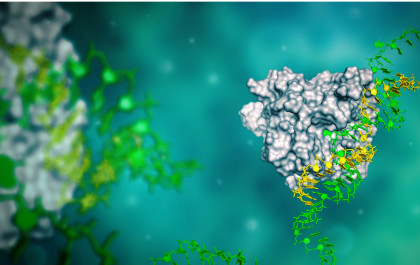ProQR Doses First Patient in Phase 2/3 ILLUMINATE Trial of Sepofarsen for LCA10
LEIDEN, The Netherlands and CAMBRIDGE, Mass., April 15, 2019 (GLOBE NEWSWIRE) -- ProQR Therapeutics N.V. (Nasdaq:PRQR), a company dedicated to changing lives through the creation of transformative RNA medicines for the treatment of severe genetic rare diseases, today announced the first patient dosed in the Phase 2/3 ILLUMINATE clinical trial for sepofarsen (formerly named QR-110) in patients with Leber’s Congenital Amaurosis 10 (LCA10). Data from the study are expected at year-end 2020.
“Inherited retinal degenerations caused by mutations in the CEP290 gene frequently lead to blindness in early childhood. No form of therapy is currently available,” said Dr. Katarina Stingl of the Center for Ophthalmology in Tübingen, Investigator in the ILLUMINATE trial. “ProQR’s RNA therapy for the p.Cys998X mutation showed the potential to improve vision in an earlier trial, which is encouraging and of great importance to the affected patients.”
“The start of the ILLUMINATE trial marks an important milestone towards our goal of bringing this novel and most advanced therapy for LCA10 to patients,” commented Dr. Aniz Girach, Ophthalmologist and Chief Medical Officer of ProQR. “With the ongoing trials in LCA10 and Ushers syndrome type 2, and the start of our clinical program for adRP later this year, we are breaking new ground and paving the way for new treatments in multiple severe inherited retinal diseases.”
LCA10 is the leading genetic cause of blindness in childhood and currently there is no approved treatment available to patients. Sepofarsen targets the most common p.Cys998X mutation in CEP290 that affects approximately 2,000 people in the Western world.
About the Phase 2/3 ILLUMINATE trial
ILLUMINATE, or PQ-110-003, is a randomized, prospective, double-masked, sham-controlled 24-month trial of sepofarsen that will initially enroll 30 adults and children (over eight years of age) who have LCA10 due to one or two copies of the p.Cys998X mutation in the CEP290 gene and a baseline best corrected visual acuity (BCVA) of 3.0 LogMAR or better. The trial is designed with the potential to serve as the sole registration trial for the program.
Participants will be assigned equally to three parallel study arms (two active dose levels; 40 μg (with an 80 μg loading dose) and 80 μg (with a 160 μg loading dose); and a sham control arm) with ten participants in each arm. Participants will receive a dose of sepofarsen or a sham-procedure at the start of the trial, at three months and then every six months afterwards.
The primary endpoint will be mean change in BCVA from baseline in the active treated arms compared to the control arm. A mobility course endpoint will also be simultaneously evaluated. Additional endpoints will include full field stimulus testing, ocular instability and optical coherence tomography. Changes in quality of life in the trial participants will also be evaluated. The study will incorporate adaptive sample size re-estimation based on pre-specified criteria overseen by an independent statistician. ILLUMINATE is a global trial to be conducted at sites in North America and selected European countries with significant expertise in genetic retinal diseases.
About sepofarsen
Sepofarsen (formerly named QR-110) is a first-in-class investigational RNA-based oligonucleotide designed to address the underlying cause of Leber’s Congenital Amaurosis 10 due to the p.Cys998X mutation (also known as the c.2991+1655A>G mutation) in the CEP290 gene. The p.Cys998X mutation is a substitution of one nucleotide in the pre-mRNA that leads to aberrant splicing of the mRNA and non-functional CEP290 protein. Sepofarsen is designed to restore normal (wild-type) CEP290 mRNA, leading to the production of normal CEP290 protein by binding to the mutated location in the pre-mRNA, causing normal splicing of the pre-mRNA. Sepofarsen is intended to be administered through intravitreal injections in the eye and has been granted orphan drug designation in the United States and the European Union and received fast-track designation from the FDA.
About Leber’s Congenital Amaurosis
Leber’s Congenital Amaurosis (LCA) is the most common cause of blindness due to genetic disease in children and consists of a group of diseases of which LCA10 is the most frequent and one of the more severe forms. LCA10 is caused by mutations in the CEP290 gene, of which the p.Cys998X mutation is the most common. LCA10 leads to early loss of vision, causing most people to lose their sight in the first few years of life. To date, there are no treatments approved that treat the underlying cause of the disease. Approximately 2,000 people in the Western world have LCA10 because of this mutation.
About ProQR
ProQR Therapeutics is dedicated to changing lives through the creation of transformative RNA medicines for the treatment of severe genetic rare diseases such as Leber’s Congenital Amaurosis 10 and Usher syndrome type 2. Based on our unique proprietary RNA repair platform technologies we are growing our pipeline with patients and loved ones in mind.
*Since 2012*
FORWARD-LOOKING STATEMENTS
This press release contains forward-looking statements. All statements other than statements of historical fact are forward-looking statements, which are often indicated by terms such as “anticipate,” “believe,” “could,” “estimate,” “expect,” “goal,” “intend,” “look forward to”, “may,” “plan,” “potential,” “predict,” “project,” “should,” “will,” “would” and similar expressions. Forward-looking statements are based on management’s beliefs and assumptions and on information available to management only as of the date of this press release. These forward-looking statements include, but are not limited to, statements regarding sepofarsen and its clinical development and therapeutic potential, including statements about the ILLUMINATE trial, trial design, site locations and timing of results from this trial, and the potential use of the ILLUMINATE trial as the registration trial for the program. Our actual results could differ materially from those anticipated in these forward-looking statements for many reasons, including, without limitation, risks associated with our clinical development activities, including that positive results observed in our prior and ongoing studies may not be replicated in later trials or guarantee approval of any product candidate by regulatory authorities, regulatory review or approval process, enrollment in our clinical trial and timing of results, the need for expanded or additional clinical testing, manufacturing processes and facilities, regulatory oversight, product commercialization, intellectual property claims, and the risks, uncertainties and other factors in our filings made with the Securities and Exchange Commission, including certain sections of our annual report filed on Form 20-F. Given these risks, uncertainties and other factors, you should not place undue reliance on these forward-looking statements, and we assume no obligation to update these forward-looking statements, even if new information becomes available in the future, except as required by law.
ProQR Therapeutics N.V.
Investor Contact:
Hans Vitzthum
LifeSci Advisors
T: +1 617-535-7743
hans@lifescieadvisors.com
Media Contact:
Sara Zelkovic
LifeSci Public Relations
T: +1 646 876 4933
Sara@lifescipublicrelations.com


